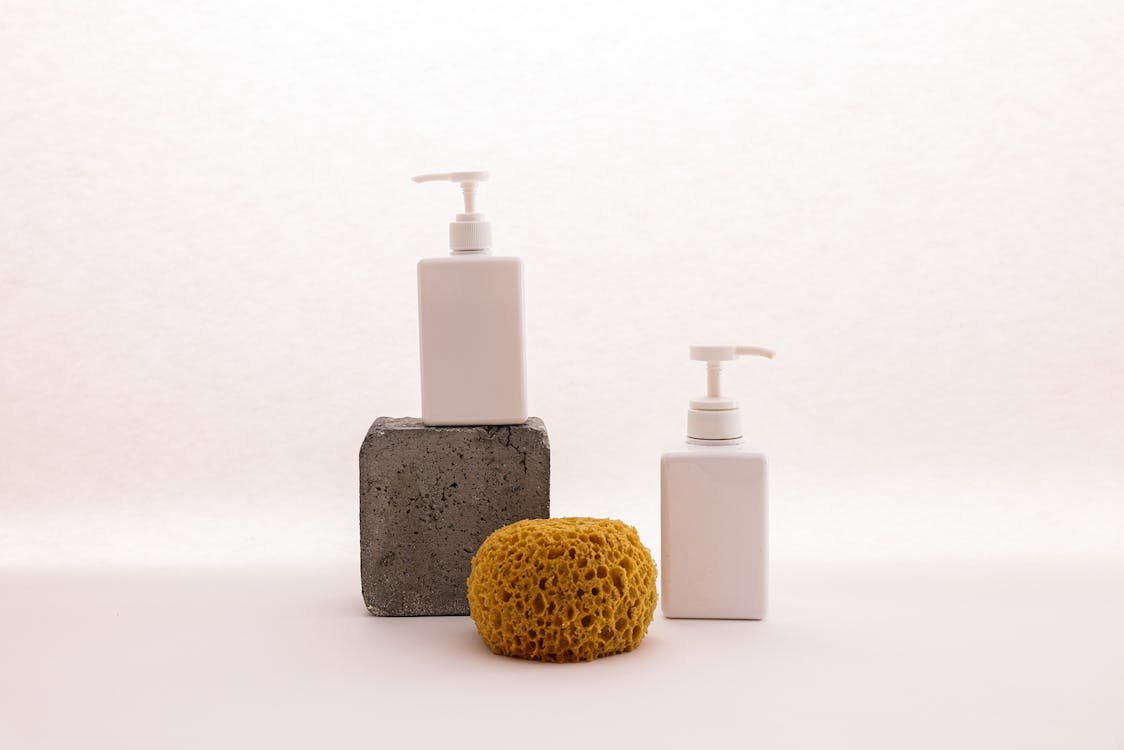How Endocrine Disrupting Chemicals affect Male Fertility and How to Reduce Your Exposure
When it comes to making changes for our fertility, we tend to focus on diet strategies that can be implemented to optimise chances of conceiving. Sometimes we also talk about lifestyle, but less often do we consider something we’re all exposed to every day of our lives that could be harming male fertility and sperm quality: Endocrine Disrupting Chemicals (EDCs).
Before you panic, it’s important to note that you can reduce your exposure to EDCs, but it takes awareness and active effort to do so. Reducing your exposure can have great benefits for male fertility and sperm health, so it’s worth your consideration!
Let’s dive into exactly what EDCs are, how they affect male fertility, and how you can reduce exposure to optimise your fertility.
What are endocrine disrupting chemicals?
Endocrine disrupting chemicals, or EDCs, are widespread chemicals which exist in the environment we live in, the food we consume and the products we use. EDCs include bisphenol A (you’ll know that as BPA), dioxins, pesticides, heavy metals and parabens.
These chemicals interfere with the normal function of your endocrine system, which is the system responsible for producing and secreting your hormones. They can mimic or block the natural processes of the endocrine system, “tricking” your body into thinking it has produced more or less of certain hormones than it actually has, including testosterone and oestrogen.
Common types of EDCs
Some of the common EDCs we are exposed to include:
Pesticides are used in farming or agriculture to prevent or destroy weeds, bacteria, fungi and other pests in fresh produce. While strict regulations exist to control the use of these chemicals, we will want to limit our exposure via our food supply.
Heavy metals can be found in alcohol, some supplements, cigarettes, and some contaminated foods, air and water supplies. Lead and mercury are two examples of heavy metals which are harmful to your health when consumed excessively.
Bisphenols, especially BPA, are used to make plastics more flexible. However BPA can actually leach out of these plastics and enter the foods they contain. Similarly, this leaching can occur from receipts, personal care products and other items containing bisphenols.
Parabens are chemicals used to preserve the shelf-life of cosmetics, beauty products etc. Remember, you don’t have to “eat” EDCs for them to enter your body systems, topical (or skin) contact can have the same effect.
Phthalates are also used in plastics, often to make them more durable, as well as some cosmetics and household goods. They’re found in products like soaps, shampoo, hair spray, scented candles, plastic bags, as well as contaminated air, food and dust particles.
Dioxins are a toxic compound that is a by-product of some manufacturing processes, and can also occur from natural processes like forest fires. Dioxins are widely distributed through the environment and our food supply (including in dairy products, meat, fish and shellfish) though many countries monitor their food supply for dioxins to prevent the consumption of large amounts.
How do endocrine disrupting chemicals affect male fertility?
1.They create oxidative stress and chronic inflammation in your body.
Oxidative stress is caused by free radicals, which are certain molecules that can interfere with your body’s antioxidant defence system. These free radicals can negatively affect sperm function and quality, by reducing sperm’s motility, damaging the cellular membranes, and even causing DNA damage to sperm.
Phthalates have been shown to cause oxidative stress in the body, which can go on to affect your reproductive health. Other EDCs have also been linked to oxidative stress and higher levels of inflammation. Exposure to BPA has been associated with significant increases in inflammatory markers.
2.EDCs can interfere with the production and effect of male sex hormones.
Long-term exposure to EDCs can have effects on male reproductive health by interfering with the production and actions of sex hormones such as testosterone and oestrogen. Any change to the normal production of these hormones can result in abnormal reproductive function.
At the moment, most studies have been conducted on animals. However, existing rat studies show phthalate exposure in male rats reduces testicular testosterone levels and testosterone production, and impairs steroidogenesis (the conversion of cholesterol into steroid and sex hormones).
BPA can also affect reproductive hormone function in males by interfering with hormone receptors in the body. BPA can affect steroidogenesis, testosterone production and even development of the reproductive organs. The effects of BPA and other EDCs can cause defects to the testis, as well as compromising the production of sperm.
3.EDCs impair the quality of your sperm.
Different EDCS affect semen quality via different processes and actions on your endocrine system, but BPA, phthalates, dioxins and other EDCs have all been linked to decreased sperm quality. Sperm quality is really important to consider if you’re looking to optimise your chances of conceiving.
Over the last 50 years sperm counts have fallen significantly around the world. Decreases in sperm morphology, motility, concentration, count and volume are a contributor to the increase in male infertility. Now, during the 50 years where we’ve seen these trends, EDC exposure levels have risen, suggesting EDCs are a factor contributing to declining male fertility.
Higher levels of bisphenols (including BPA) and phthalates found in men’s urine have both been linked to poorer semen quality. Men who were exposed to higher levels of BPA have been shown to have lower sperm concentration, count, vitality and motility compared to men who didn’t have as significant exposure. Dioxins and phthalates have also been linked to a reduction in sperm quality and reproductive function.
4.They can cause sperm DNA damage.
One of the signs of oxidative stress is DNA damage, which is particularly concerning given it affects not only the father, but also potentially future children. Sperm DNA damage can have a negative effect on couples’ reproductive outcomes - both in terms of natural conception and in cases where assisted reproductive technology is used.
Sperm DNA damage is associated with lower rates of fertilisation, poorer embryo quality and increased risk of spontaneous miscarriage. Infertile males have been shown to have higher levels of DNA damage than fertile men, highlighting the extent that this can impact your fertility. Plus, sperm DNA damage may result in structural chromosomal abnormalities in a male’s sperm, which can lead to birth or congenital defects in some cases.
Phthalates have been shown to trigger DNA damage at higher concentrations, interfering with gene transcription and sexual development. Similarly, BPA has been linked to increased sperm DNA damage. The higher concentration of BPA males were exposed to, the more sperm DNA damage they experienced.
How much do you have to consume before EDCs become dangerous?
To date, there's been no established “limit” to the level of EDCs you can be exposed to without any harm to your health or fertility.
At the moment, many of the studies have been conducted on animals, given the unwillingness of humans to be subject to these dangerous chemicals. The research that does exist suggests that low levels of exposure are not likely to have significant adverse effects. HOWEVER, it’s important to note that you’re very rarely exposed to just one variety of EDC - we are often exposed to multiple types and sources.
EDCs can have dose-additive effects, meaning their impacts are compounded as you’re exposed to multiple different types. This combined effect is more concerning and important to address, as it’s the reality for many men (and women). So while there’s no safe “limit” as such, the best thing you can do is to try and reduce your consumption of EDCs wherever possible.
How can you reduce your exposure to EDCs?
In order to protect and optimise your fertility, here are a few changes you can make...
Minimise using plastic containers or wrapping for your food. Make sure you never reheat your food in plastics, as the BPA or similar chemicals contained in plastics can leach out more when heated.
Minimise your use of plastic packaging. Plastic packaging is the main source of EDC exposure for the average person, so this is a big area to focus on.
Stop using plastic water bottles, and get yourself a glass, ceramic or stainless steel bottle instead!
Choose products that don’t contain any parabens when you’re buying items like body wash, shampoo etc. Consult the ingredients list before buying.
Make sure to thoroughly wash all fruit and veg before eating or cooking it, to remove pesticides and other chemicals which may be present.
Reduce your consumption of higher-mercury seafood. In Australia this includes orange roughy, catfish, marlin and swordfish. Learn more about mercury and seafood in my blog post HERE.
Let fresh air into your home to improve air quality! Open your doors and windows as often as you can, and minimise the use of air fresheners, scented candles and perfumed products in your home, as these can be sources of EDC, and often interfere with air quality.
Similarly, heavy perfumes can contain high concentrations of EDCs, so consider ditching your perfume or opting for a natural alternative instead.
Please note, just because a product is labelled “BPA-free” doesn’t mean it’s free from EDCs. Many of these products contain other chemicals such as BPS instead, which has a similar effect on your endocrine system. So it’s safest to avoid plastics as much as possible, even when marketing and labelling makes them seem ‘safe’.
Small, intentional swaps and actions can make a world of difference in avoiding any potential harm to men’s reproductive health, sperm quality, and ability to conceive a baby - so they’re very worthwhile changes to make!
Want to understand the most effective, evidence-based strategies and tools to enhance male fertility? Join my Male Fertility Nutrition Masterclass Series today, to get access to all the information you need to give yourself the best chance at building the family you want.
You’ll get exclusive access to two on-demand webinars, as well as The Ultimate Male Fertility Nutrition eBook and 14 Day Meal Plan, providing you with the most comprehensive resources required to enhance your fertility. Sign up now and p.s. - use the code MALEFERT10 at checkout for a sneaky 10% off!








